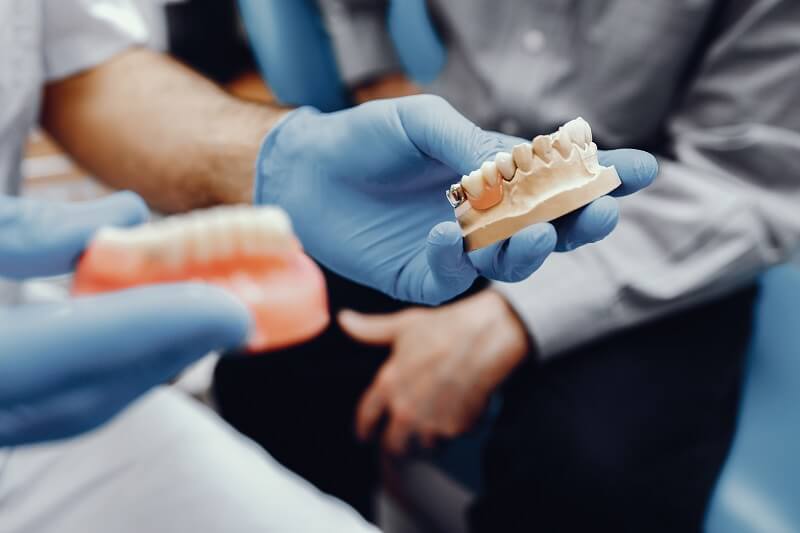
Dental implant can be understood as an artificial root of teeth that is used in the dentistry department for its establishment. This implant is surgically placed into the bone of a jaw which particularly allows the dentist to replace the teeth into that area. If someone wants to consider a dental implant, they must need to have adequate bone as well as healthy gums. Not every dental implant proves to be successful for the patient as this process may not always work as compared to other dental procedures.
Here are some common causes that lead towards the failure of dental implant. Most of the implants are divided into three parts, namely abutment, a titanium implant body, and a crown. The abutment is an attachment and crown is there to fix with it to align with the remaining teeth. One can face issues if any of the three gets broken or loose.
There is a process called Osseo integration where a body generates living bone cells to produce around the surface of an implant and anchor it to the jawbone. If this process does not perform like in the way it needs to, problems can arise eventually after the implant is settled.
Symptoms
The word dental implant sometimes proves to be a problem for a patient when it is not treated with proper care and the result may prove to be a failure. In worldly affairs, people try to motivate the other by saying the failure can make you stronger. But unfortunately, this line does not fit completely in the context of a dental implant.
However, so many people in this world would have taken benefits from dental implants, but still, they have that potential to fail. 5% is the rate at which this implant fail. This is one of the major symptoms behind the failure of dental implant.
Those who suffer from a disease called autoimmune have a higher dental implant failure rate as compared to those without. Even the blood supply becomes poor as well. This is because clotting of blood open the wounds and carry that nutrition which are necessary for the body to heal. That’s why if there seems a lack of blood rushing to the surgical portion or area, the process of healing might slow down or stopped.
There are some other symptoms of dental implant failure that consist of infections. An infection named as peri-implantitis, which is a type of gum disease, affects dental implants. It can take place even in the beginning or after the surgery. At the time of dealing with this implant, one must need to take special care of their body especially their teeth and gums as it can affect the success of this treatment.
Another symptom that arises during dental implant failure is an allergic reaction. Titanium is used in most cases at the time of dental implants that sometimes contains small traces of nickel. That is why the chances of allergic inflammatory reaction may arise in some patients.
The failure of this implant can provide damage to nerves or tissues as well. Even if an experienced dentist is treating the patient, a minimal amount of tissue damage is expected.
There are different types of risk factors that appreciate the failure of dental implant which is as follows.
Some signs of dental implant failure have already been mentioned above. Here we are talking about long-term failures. Long term or later failures are those where failure arise from initial time to near about 10 years after the procedure. There is an under-engineered procedure in which a small amount of implants are there to assist the replacement teeth. It results in providing too much stress on the implants.
Even smoking matters a lot in dental implant failure. Those who are habitual of smoking and need dental implants face a higher risk of a failed implant. However, dentists recommend the smokers to stop this activity if they want to make their implant successful as smoking is truly a risk factor in dental implant failure.
Tissues also play an important role in the signs of dental implant failure. If the patient is lacking behind with proper amount of gum tissue in its body, then more chances build for the implants to loosen or even fail. That is why the amount of gum tissues signifies the quality of a seal which is around the implants.
If a person is trying to opt dental implant and is suffering from diseases like head, neck or mouth cancer and is facing radiation therapy, the chances of risk eventually arise in the failure of the dental implant. Even the sign of dental implant does not suit those who have a sufficient bone to support an implant as bacteria can enter and make an infection in the site. It is hard for the human body to rid this crowded and tiny area of bacteria, and the surgeon who is treating may need to replace the implant.
Other common causes of dental implant conclude mechanical damages like if an implant gets injured from any injury to the mouth or teeth, it can cause it to be a failure and if proper care is not observed at a particular interval of time, the dentist might have to replace the implant.
Some common and major signs as well as symptoms of both late and early dental implant failure includes shifting or loose implant, severe pain or discomfort, problems is chewing and biting, inflammation and swelling of gums and gum recession around dental implant.